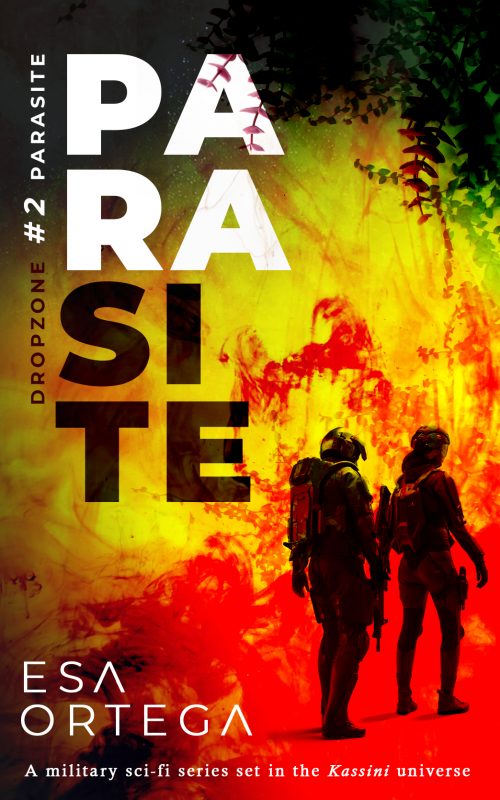Parasite (Dropzone #2) is the second instalment of the Dropzone series of military sci-fi books. It continues from directly where Fleet Rats (Dropzone #1) left off, with the same characters, in the same universe.
Here’s the blurb for the second book…
Contact lost. Trouble found.
The Vektor’s Landing safari park has rare animals from all around the galaxy. It has lush forest bathed in ultra-golden sunlight. It’s a paradise – and it’s one of the most exclusive tourist destinations in the whole of the Elemental empire.
Or at least it was, until it went completely quiet…
Something has gone seriously wrong: which makes this a job for the Sleeper Agency. Fresh from the baptism of fire that was their first mission, Hoffman’s Revenants – a band of misfit human and alien soldiers led by the enigmatic Virgil Lovell – have been sent down to the surface to investigate.
Their mission? Rescue as many breeding pairs of the park’s priceless lizards as they can… oh, and find out what happened to the 1,500 tourists who have completely vanished. All of which would be fine if the Agency didn’t keep changing their mission orders every five minutes.
It would probably also help if someone hadn’t just sent a fleet to nuke the park from orbit…
Strap in for the second instalment of the Dropzone series of military sci-fi adventures set in the Kassini universe, for fans of Starship Troopers, Invasion Of The Body Snatchers, Aliens and other classic sci-fi.
NOTE: If you’re interested in the story but haven’t yet read Fleet Rats, please do so first… as this is not a standalone tale!
Visual promo…



Here are some inspirations that fed into the book…
Invasion Of The Body Snatchers (1978)

Was there ever a better remake, sci-fi or otherwise, than this 1978 reimagining of one of the genre’s most disturbing stories? A superb ensemble cast (Donald Sutherland, Brooke Adams, Leonard Nimoy, Jeff Goldblum, Veronica Cartwright and others) absolutely nail the claustrophobia of the storyworld and the feeling that the paradigm of reality is shifting before their eyes.
Parasite acknowledges the disturbing central idea that the spores responsible for the invasion just drift eternally across space, waiting to settle on their next victims. When they establish a foothold, there is no moral dimension: they just transform the unfortunate population out of necessity, according to a cold, amoral and overriding desire to survive.
The Day Of The Triffids by John Wyndham (1951)

Another 1950s classic, I have always bleated on to anyone who will listen about how I believe Wyndham’s post-apocalyptic tale has one of the most ingenious and immersive openings of any novel I’ve read: analysed on its own, it’s almost as though he was trying to deliberately construct a masterclass in creative writing. I suspect this sort of thing is one of many reasons why people tend to sidle away from me at parties, but no matter – I stand by it. The idea of sudden blindness is, of course, profoundly disturbing: which is why I had the creatures infesting the planet on which Parasite is set subdue the population by changing their vision in unsettling ways.
The Traitors (2022)

This recent hit reality TV show would seem to have little to do with sci-fi on the surface. However, at its heart, what makes it such an addictive watch is that its format’s sole aim is to brutally engender the breakdown of group dynamics, to foster suspicion and basically expose the worst of human nature. These are the ingredients for great drama, so I thought I’d introduce a few elements of this to the unfolding story cycle of the Dropzone series to see what would happen when it isn’t just human nature, but also that of the Elementals and Avions, in the mix.
The Unlimited Dream Company by JG Ballard (1979)

The much-missed British SF writer made a huge impression on me as an avid teenage reader. I simply wasn’t psychologically prepared for the thematic undercurrents of his books: reading him and Angela Carter for the first time introduced me to the idea that a text can have an unconscious, that you can only glimpse out of the corner of your eye, like looking at a distant galaxy or something. My personal favourite of all of his creations and the one I regularly re-read is this: I still don’t understand it, but the strange psychogeographical setting, its unreliable, messianic narrator and the descriptions and imagery of suburbia being transformed into a lush jungle always stayed with me.
The Garden Of Rama by Arthur C Clarke and Gentry Lee (1991)

In 1979’s Rendezvous With Rama, a mysterious cylindrical spaceship arrives in our solar system, prompting a mission to explore it. In this third book in the sequence, it returns again, and a conflict breaks out between the various species held by the enigmatic star ark, of which we humans are only one. Vektor’s Landing, the Elemental colony world where Parasite takes place, is surely one safari park we’d all pay to visit… just maybe not when it’s been taken over by an invasive species of mind-controlling bugs.

